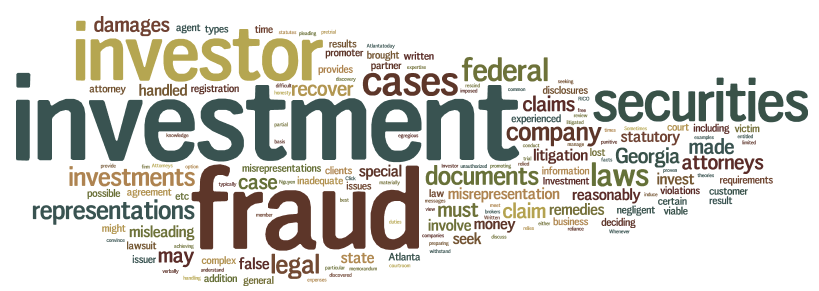A search for synonyms for the noun fraud returns myriad results including cheating, swindling, embezzlement, deceit, deception, double-dealing and chicanery. Unfortunately, these terms are too often associated with financial investments that turn out far different than investors originally expected or hoped. So long as there is profit to be gained through unscrupulous and illegal investment activities, investment and securities fraud will always post a threat to countless individuals and institutions. 
By definition, investment fraud is “the illegal activity of providing false information to someone so that they will invest in something.” But investor or securities fraud comes in many shapes and varieties. Misrepresentations may be made in writing, such as through a prospectus, offering memorandum, or other investment documents. Misrepresentations may also be made through written or verbal communications such as emails, correspondence and presentations. Typically, misrepresentations are made by an issuer or agent (such as a dealer-broker) of the target investment. However, fraud may also be committed by business partners or principals of a business.
In addition to traditional fraud and misrepresentation, there are other categories of investor fraud claims such as brokers-dealers claims for unsuitability (recommending or selling unsuitable investments to clients), churning (excessive selling-buying within a brokerage account to generate commissions), unauthorized trading, breach of fiduciary duty, and other claims. Then there are fraudulent investments such as Ponzi schemes, where investors are promised or even shown investment returns that don’t actually exist but instead are paid by new investor money. Ultimately, these houses of cards always collapse leaving investors out in the cold.
There is always a degree of risk involved in financial investments. However, when investment fraud occurs and investors are given false or misleading information before investing, it can be difficult, if not impossible, to accurately gauge the risk and make an informed investment decision. As a result, losses occur – sometimes catastrophic losses – and stunned investors are left wondering what to do. Fortunately, Atlanta attorneys Brownstein and Nguyen are experienced in investment and securities fraud litigation.
They have successfully represented and reclaimed funds for clients involved in real estate, start-up investing, and broker/dealer investment fraud. With stories in the news regarding misrepresentation in investments involving stocks, hedge funds, and precious metals, there are sure to be more individuals out there who have suffered financial loss as a result of an investment fraud.
If you believe that you or someone you know has suffered financial loss as a result of fraud or misrepresentation in an investment, contact Brownstein and Nguyen in Atlanta. However, don’t delay as the law imposes strict time deadlines on investor claims and lawsuits.









